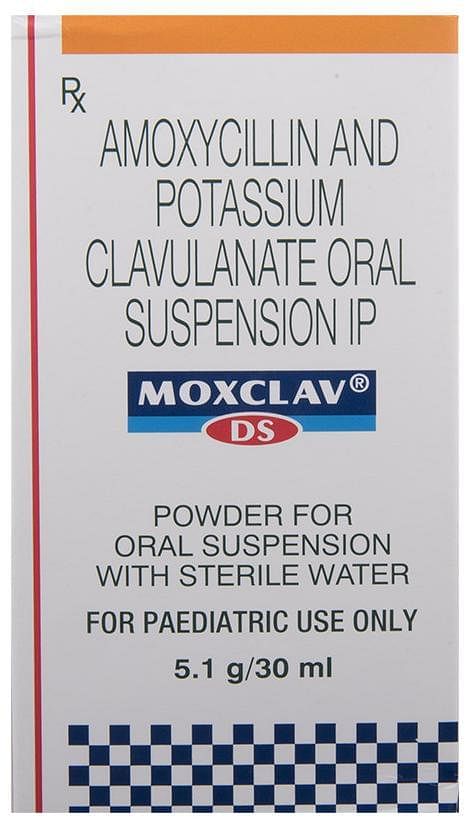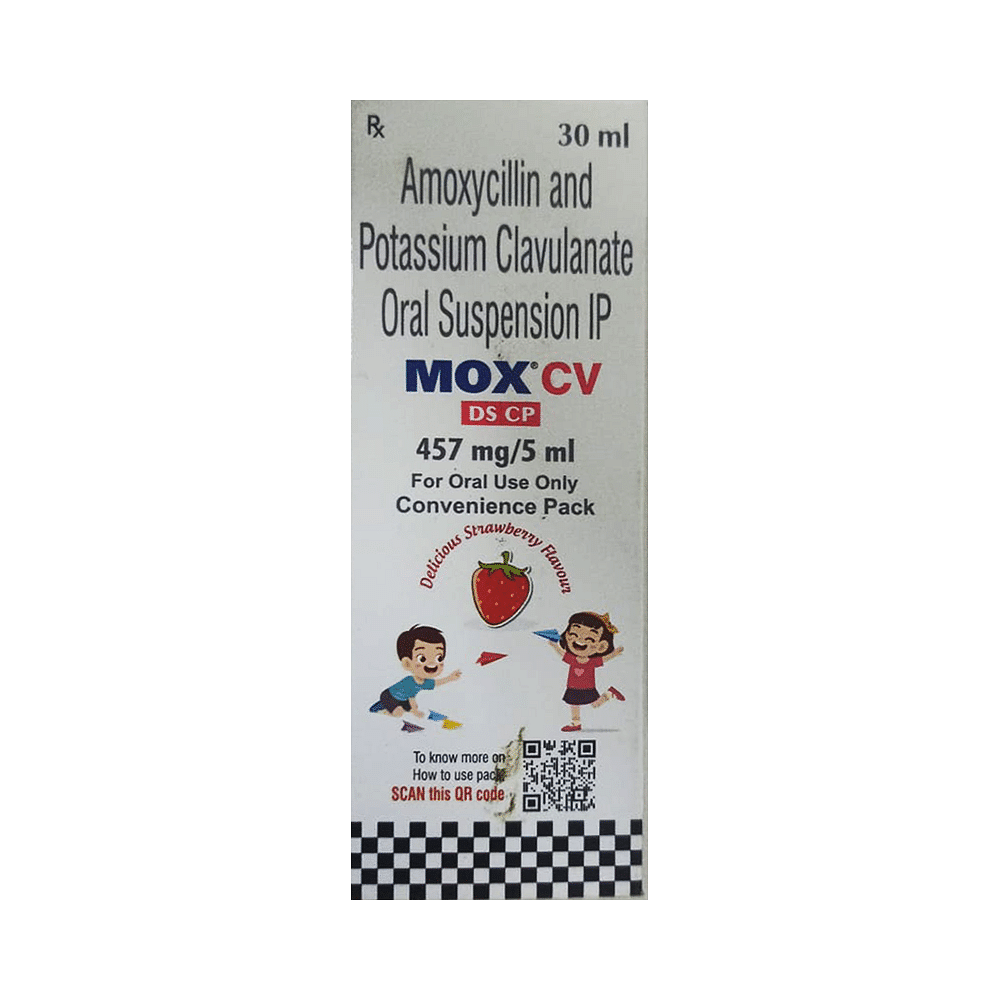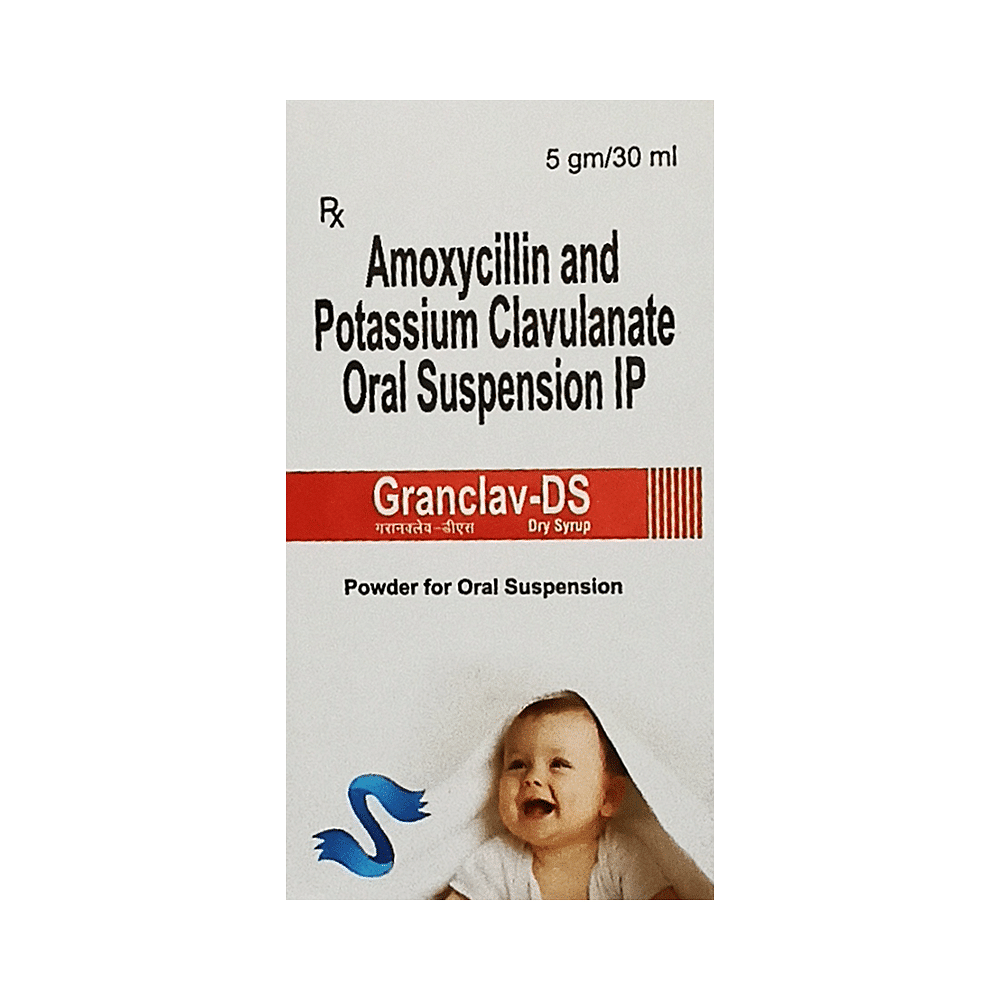
Amoxylav-DS Dry Syrup
Manufacturer
Vytrax Healthcare
Salt Composition
Amoxycillin (400mg) + Clavulanic Acid (57mg)
Key Information
Short Description
Amoxylav-DS Dry Syrup is an antibiotic medicine that helps treat bacterial infections of the ear, nose, throat, chest, lungs, teeth, skin, and urinary tract.
Dosage Form
Oral Suspension
Introduction
Amoxylav-DS Dry Syrup is an antibiotic medicine that helps treat bacterial infections of the ear, nose, throat, chest, lungs, teeth, skin, and urinary tract. It is capable of killing bacteria that have become resistant to other therapies and thus also helps treat tuberculosis that is resistant to other treatments.
Directions for Use
Your child must complete the entire course of antibiotics. Stopping too soon may cause the bacteria to multiply again or cause another infection.
How it works
Amoxylav-DS Dry Syrup is an antibiotic. It has two active agents amoxycillin and clavulanic acid. Amoxycillin works by preventing the formation of the bacterial protective covering (cell wall) essential for the survival of the bacteria. Whereas clavulanic acid serves a special purpose of inhibiting an enzyme (beta-lactamase) that is produced by resistant bacteria. This makes the combination of amoxycillin and clavulanic acid an effective line of treatment for many types of infections.
Quick Tips
Your child must complete the entire course of antibiotics. Stopping too soon may cause the bacteria to multiply again or cause another infection. Your child may have a bitter taste in the mouth after the intake of Amoxylav-DS Dry Syrup. Eating citrus fruit or sipping plenty of water or fruit juice may help. Encourage your child to drink plenty of water in case diarrhea develops as a side effect. Never give Amoxylav-DS Dry Syrup until and unless prescribed by the doctor. Do not give Amoxylav-DS Dry Syrup to treat common cold and flu-like symptoms caused by viruses. Never save medicine for future illnesses. Check ‘expiry’ before giving Amoxylav-DS Dry Syrup to your child. Immediately discard all the expired medicines. Stop Amoxylav-DS Dry Syrup immediately if your child develops an itchy rash, facial swelling, or breathing difficulty.
Related Medicines

Moxclav DS 457mg Oral Suspension

Mox CV DS CP Oral Suspension Delicious Strawberry

Bclav-DS Dry Syrup Orange

Granclav-DS Dry Syrup

Ziclave Forte Oral Suspension

Moxyben Oral Suspension

Nefmox-CV DS Dry Syrup

Moxycare CV Duo Dry Syrup

Joymentin DS Oral Suspension

Stilmox-CV Dds Dry Syrup
Frequently asked questions
Can other medicines be given at the same time as Amoxylav-DS Dry Syrup?
Amoxylav-DS Dry Syrup may interact with other medications or substances. It's important to inform your child's doctor about all other medications they are taking before starting this treatment. Before giving any medicine to your child, consult your child's doctor for guidance.
Can I get my child vaccinated while on treatment with Amoxylav-DS Dry Syrup?
Antibiotics typically do not interfere with the ingredients in vaccines or cause a negative reaction in a child who has recently been vaccinated. However, children taking antibiotics should wait to be vaccinated until they have recovered from their illness. Once your child feels better, you can administer the vaccine.
Which lab tests may my child undergo while taking Amoxylav-DS Dry Syrup on a long-term basis?
For prolonged treatment, a doctor may periodically check for kidney and liver function during monitoring.
Can I give a higher than the recommended dose of Amoxylav-DS Dry Syrup to my child?
Giving a dosage exceeding the prescribed amount can heighten the risk of adverse effects. If your child experiences worsening symptoms, consult your doctor for re-evaluation.
Can I stop giving Amoxylav-DS Dry Syrup to my child when the symptoms are relieved?
Do not discontinue this medication unless your child has completed the full course of treatment. Even if you feel better, it's crucial to finish the entire regimen as the medicine might continue to offer benefits.
Can the use of Amoxylav-DS Dry Syrup cause diarrhea?
Yes, Amoxylav-DS Dry Syrup may cause diarrhea. This is due to its antibiotic nature, which eliminates harmful bacteria and can also disrupt the balance of good bacteria in your child's gut, leading to diarrhoea. In case of diarrhoea, encourage drinking plenty of fluids. If the diarrhea persists or you notice signs of dehydration like decreased urination with dark-colored and strong-smelling urine, consult your doctor before administering any further medication.
Do all viral common colds result in secondary bacterial infection?
Most often, bacterial infections do not follow viral infections. It's important to remember that antibiotics should only be used after consulting with your child's doctor when a doctor determines a bacterial infection is present.
The mucus coming out of my child’s nose is yellow-green. Is it a sign of a bacterial infection?
Yellow or green mucus in the nose does not necessarily indicate a bacterial infection. It's typical for mucus to thicken and change color during a common cold, and these symptoms usually persist for 7-10 days.
Is there any sign which shows that my child needs immediate medical attention?
It is crucial to contact your child's doctor immediately if they experience severe allergic reactions (breathing difficulties, skin rashes), gastrointestinal issues like diarrhoea, or liver damage (weakness, paleness, vomiting). Although rare, these side effects require expert intervention.


